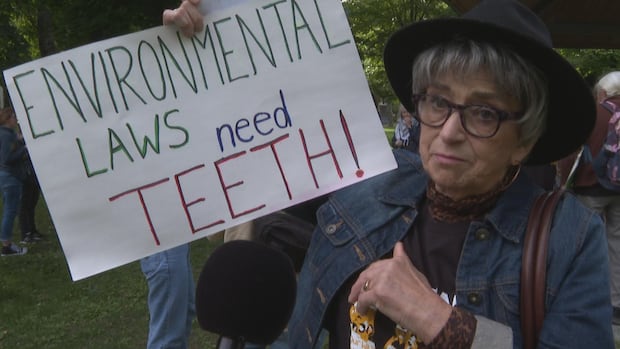St. John's Protesters Join National 'Draw the Line' Rally Against Carney's Agenda
On Saturday, protesters in St. John's, Newfoundland and Labrador, gathered at Bannerman Park as part of a nationwide 'Draw the Line' rally. The demonstrations aimed to challenge the policies of the Liberal government, particularly concerning fossil fuel projects, military spending, and potential public sector job cuts.
Concerns Over Fossil Fuel Projects and Government Direction
Yvonne Earl, a spokesperson for the Avalon chapter of the Council of Canadians, voiced concerns about the government's shift towards a more corporate agenda. She stated that there is significant opposition to the current direction of both federal and provincial governments. "Since Mr. Carney came into power, he's really moved the Liberal Party more to the right and the agenda has become quite corporate," said Earl.
The protesters united various groups, including those focused on climate justice, migrant justice, Indigenous justice, and Palestine solidarity. Similar protests occurred in major cities like Toronto, Ottawa, and Vancouver.
Diverse Groups Unite and Voice Their Demands
In St. John's, collaborating groups included the Council of Canadians, Sierra Club, Anti-Racist Coalition, and the Communist Party. The rally featured free food, speeches, petition signing, and educational sessions.
Sam Crete, a rally spokesperson, emphasized the importance of building social connections to coordinate effective climate resistance. He highlighted the opportunity for participants to connect and learn from each other: "People are talking to each other, people are getting to know each other," Crete said. "That's what's really important, making those social connections so that we can effectively coordinate real climate resistance."
Climate Justice and Indigenous Sovereignty at the Forefront
With the upcoming provincial election in mind, Yvonne Earl stressed the significance of climate justice in her voting decisions. She pointed to the recent forest fires in Newfoundland and Labrador and across Canada, arguing that continued funding of fossil fuel projects would exacerbate the problem. "We've all seen the forest fires and the devastation that we've had here in Newfoundland and it's happening across Canada," Earl said.
Sam Crete also raised the issue of Indigenous sovereignty, stating that effective climate action requires decolonization and empowering Indigenous groups. He said that "We can't effectively resist climate change without decolonizing and then allowing Indigenous groups to have the sovereignty and the choice and the power on how that is done."
Concerns About Mega Projects and Military Spending
Roberta Benefiel, who lives on the Churchill River and is involved with Grand Riverkeeper Labrador, spoke about the environmental impacts of the Churchill Falls memorandum of understanding and the potential consequences of new hydro dam projects, emphasizing the harm to the environment and Arctic ecosystems. Benefiel stated that "If we keep building new hydro dams, we're destroying the earth and we're destroying the Arctic and the fisheries."
Protesters also criticized the government's plan to increase military spending to meet NATO's defence spending goal, arguing that the funds could be better used to address pressing social issues. "That's $150 billion when people are going to the grocery store and they're scared because everything is so expensive [...] and it's going toward bombs," Crete said. "I don't really see how that helps Canadians at all." Crete hoped that politicians were attentive to the concerns raised during the protests.
 Visit the website
Visit the website





